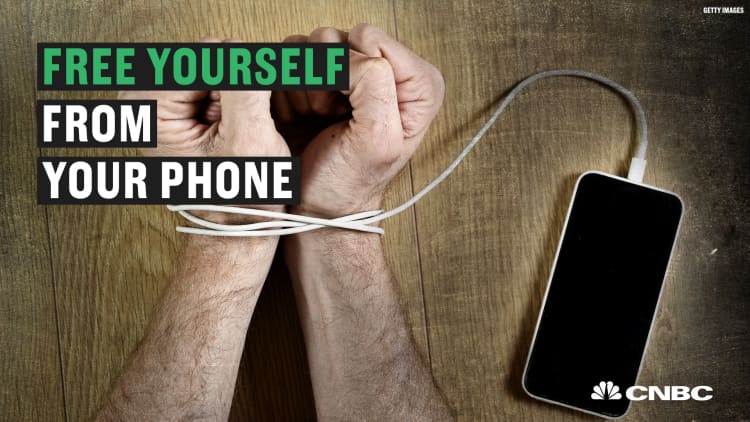Jonathan Rosenberg, Google's former SVP of product, advises one of the most important tech CEOs on the planet, Larry Page of Alphabet, Google's parent company.
He's also co-author, with executive chairman Eric Schmidt, of business tome "How Google Works."
It's no surprise that someone with Rosenberg's schedule admits to having an "addiction" to his smartphone, something every professional can relate to. But even this busy exec makes a point of putting his phone away while at dinner and before bed. He says the simple habit helps him relax after a busy day and fall asleep.
Scientific research says he's on to something.
"I know this is a shock," he tells CNBC, "but I find that I can control my addiction by not using it at dinner, and be sort of human and social."
He also makes a point of not bringing his phone into his bedroom, so that he can fall asleep faster.
He's not the only successful business person to encourage professionals to carve out phone-free time. Arianna Huffington, co-founder of The Huffington Post and author of "The Sleep Revolution" says that making time to be without your phone will boost your productivity and your overall happiness.
While ditching your smartphone for dinner and bedtime may seem easy, it's actually challenging for many people.
In a 2015 Bank of America Survey of 1,000 adults, some 36 percent of respondents said they constantly check their phone, and 71 percent said they fell asleep with their smartphone next to them.
While keeping in contact with the office and up to date on the news may help you feel productive, constantly reaching for your phone could be doing more harm than good. A University of Illinois study found that frequent cellphone use was linked to higher levels of anxiety and depression symptoms. A study published by the U.S. National Library of Medicine found that high mobile phone use was associated with sleep disturbances and symptoms of depression.
Making time to disconnect from your phone could help you feel more rested and less anxious.
According to sleep experts from Harvard University and other research centers, staring at a smartphone at night disrupts your natural circadian rhythm. The specific type of light emitted by smartphones, tablets and laptops signals the brain to stay awake.
By not bringing his phone into his bedroom, Rosenberg avoids the distraction and stimulation associated with using a phone at night. Not having your phone in bed with you increases the chances that you'll pick up an actual book and read, which has been shown to reduce stress, boost creative thinking and be part of a healthy sleep routine.
"[Smartphones, tablets and laptops] are incredibly addictive in a good way," Rosenberg says. "But it's important to be able to turn them off periodically during the day and night."
Check out the key financial lesson Rosenberg says could save you thousands of dollars



